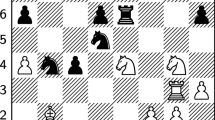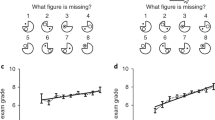Summary
The paper reviews the evidence for and against the recognition-association theory and a forward-search (SEEK) theory of chess skill. The recognition-association theory appears to be founded on indirect evidence concerning visual short-term memory, together with supplementary assumptions that may be questioned, and provides no role for verbal processes. There is no direct support for the theory, which omits forward search for reasons that are reexamined. In contrast, the SEEK theory maintains that move choice is based on search and evaluation processes supplemented (or else supplanted) by a knowledge base. These processes are directly evidenced by experimental findings. The objection that search theories cannot account for speed chess is met by a review of the available evidence. It is concluded that chess skill relies on thinking ahead rather than on pattern recognition.
Similar content being viewed by others
References
Baddeley, A. D. (1983). Working memory.Philosophical Transactions of the Royal Society of London, B302, 311–324.
Binet, A. (1894).Psychologie des grands calculateurs et joueurs d'échecs. Paris: Hachette.
Charness, N. (1976). Memory for chess positions: Resistance to interference.Journal of Experimental Psychology: Human Learning and Memory, 2, 641–653.
Charness, N. (1981 a). Aging and skilled problem solving.Journal of Experimental Psychology: General, 110, 21–38.
Charness, N. (1981 b). Search in chess: Age and skill differences.Journal of Experimental Psychology: Human Perception and Performance, 2, 467–476.
Chase, W. G., & Simon, H. A. (1973). The mind's eye in chess. In W. G. Chase (Ed.),Visual information processing (pp. 215–272). New York: Academic Press.
Church, R. M., & Church, K. W. (1977). Plans, goals and search strategies for the selection of a move in chess. In P. W. Frey (Ed.),Chess skill in man and machine (pp. 131–156). ). New York: Springer.
Cleveland, A. A. (1907). The psychology of chess and learning to play it.American Journal of Psychology, 18, 269–308.
de Groot, A. D. (1965).Thought and choice in chess (2nd ed. 1978). The Hague: Mouton.
Djakow, I. N., Petrowski, N. W., & Rudik, P. A. (1927).Psychologie des Schachspiels. Berlin: de Gruyter.
Elo, A. (1978).The rating of chessplayers, past and present. New York: Arco.
Frey, P. W. (1977). An introduction to computer chess. In P. W. Frey (Ed.),Chess skill in man and machine (pp. 54–81). New York: Springer.
Frey, P. W., & Adesman, P. (1976). Recall memory for visually presented chess positions.Memory & Cognition, 4, 541–547.
Goldin, S. E. (1978). Effects of orienting tasks on recognition of chess positions.American Journal of Psychology, 91, 659–671.
Goldin, S. E. (1979). Recognition memory for chess positions: Some preliminary research.American Journal of Psychology, 92, 19–31.
Holding, D. H. (1979). The evaluation of chess positions.Simulation and Games, 10, 207–221.
Holding, D. H. (1985).The psychology of chess skill. Hillsdale, NJ: Erlbaum Associates.
Holding, D. H. (1989 a). Adversary problem solving by humans. In K. J. Gilhooly (Ed.),Human and machine problem solving (pp. 83–122). New York: Plenum Press.
Holding, D. H. (1989 b). Counting backward during chess move choice.Bulletin of the Psychonomic Society, 27, 421–424.
Holding, D. H. (1989 c). Evaluation factors in human tree search.American Journal of Psychology, 102, 103–108.
Holding, D. H. (in press). Search process versus pattern structure in chess skill. In B. Burns (Ed.), Percepts, concepts, and categories:The representation and processing of information. New York: Elsevier.
Holding, D. H., & Pfau, H. D. (1985). Thinking ahead in chess.American Journal of Psychology, 98, 271–282.
Holding, D. H., & Reynolds, R. I. (1982). Recall or evaluation of chess positions as determinants of chess skill.Memory & Cognition, 10, 237–242.
Jongman, R. W. (1968).Het oog van de meester. Amsterdam: Van Gorcum.
Lane, D. M., & Robertson, L. (1979). The generality of the levels of processing hypothesis: An application to memory for chess positions.Memory & Cognition, 7, 253–256.
Pfau, H. D., & Murphy, M. D. (1988). Role of verbal knowledge in chess.American Journal of Psychology, 101, 73–86.
Reitman, J. (1976). Skilled perception in GO: Deducing memory structures from inter-response times.Cognitive Psychology, 8, 336–356.
Reynolds, R. I. (1982). Search heuristics of chessplayers of different calibers.American Journal of Psychology, 95, 383–392.
Saariluoma, P. (1985). Chess players' intake of task-relevant cues.Memory & Cognition, 13, 385–391.
Simon, H. A., & Gilmartin, K. (1973). A simulation of memory for chess positions.Cognitive Psychology, 5, 29–46.
Tikhomirov, O. K., & Terekhov V. A. (1967). Evristiki cheloveka.Voprosy Psikhologii, 13, 26–41.
Tikhomirov, O. K., & Vinogradov, Y. E. (1970). Emotions in the heuristic function.Soviet Psychology, 8, 198–223.
Author information
Authors and Affiliations
Rights and permissions
About this article
Cite this article
Holding, D.H. Theories of chess skill. Psychol. Res 54, 10–16 (1992). https://doi.org/10.1007/BF01359218
Issue Date:
DOI: https://doi.org/10.1007/BF01359218




